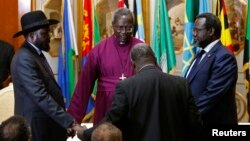ADDIS ABABA —
South Sudan’s president, Salva Kiir, and his former vice president, now rebel leader Riek Machar, will work to set up a transitional government of national unity within two months. The deal was reached in Addis Ababa, where regional leaders met Tuesday to discuss the 6-month-old conflict in South Sudan.
Kiir and Machar met for the second time since the conflict started in mid-December. The leaders had signed an agreement in early May, recommitting to a ceasefire that has been repeatedly violated by both sides.
Ethiopian Prime Minister Hailemariam Desalegn said the two warring parties have agreed to reach a settlement for the South Sudan problem.
“They agreed to complete the dialogue process in the coming 60 days on what, how and when and who to the culmination into the formation of a transitional government of national unity. And they also agreed to sign on the matrix, the timeline of the activities within the 60 days timeframe for themselves,” said Desalegn.
Regional leaders, such as Ugandan President Yoweri Museveni and Kenyan Vice President William Ruto, attended Tuesday’s talks. The east African bloc IGAD has been mediating the talks since the beginning. Discussions will continue within the coming days in Ethiopia on the details of the peace plan.
The African Union's peace and security commissioner, Ismail Chergui, urged the two sides to be serious about the discussion.
“It is the hope and the expectation of the African Union that it is high time that the warring parties will hear the call of their people and the international communities to take the forthcoming political negotiation seriously and not to use it as a forum to advance partisan position and delay of the final outcome to the talks,” said Chergui.
The conflict in South Sudan has turned into a humanitarian crisis with more than 1.3 million people displaced. A food shortage is also looming, possibly affecting even more citizens. The unrest was sparked by a power struggle between President Kiir and Machar.
Kiir and Machar met for the second time since the conflict started in mid-December. The leaders had signed an agreement in early May, recommitting to a ceasefire that has been repeatedly violated by both sides.
Ethiopian Prime Minister Hailemariam Desalegn said the two warring parties have agreed to reach a settlement for the South Sudan problem.
“They agreed to complete the dialogue process in the coming 60 days on what, how and when and who to the culmination into the formation of a transitional government of national unity. And they also agreed to sign on the matrix, the timeline of the activities within the 60 days timeframe for themselves,” said Desalegn.
Regional leaders, such as Ugandan President Yoweri Museveni and Kenyan Vice President William Ruto, attended Tuesday’s talks. The east African bloc IGAD has been mediating the talks since the beginning. Discussions will continue within the coming days in Ethiopia on the details of the peace plan.
The African Union's peace and security commissioner, Ismail Chergui, urged the two sides to be serious about the discussion.
“It is the hope and the expectation of the African Union that it is high time that the warring parties will hear the call of their people and the international communities to take the forthcoming political negotiation seriously and not to use it as a forum to advance partisan position and delay of the final outcome to the talks,” said Chergui.
The conflict in South Sudan has turned into a humanitarian crisis with more than 1.3 million people displaced. A food shortage is also looming, possibly affecting even more citizens. The unrest was sparked by a power struggle between President Kiir and Machar.
